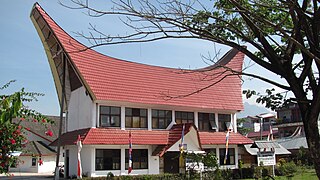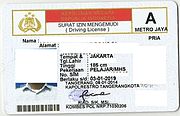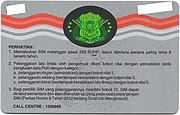Motorized vehicles in Indonesia are required to have registration plates, which must be displayed both at the front and back of the vehicles. The issuing of number plates is regulated and administered by SAMSAT, which is a collaboration between the Indonesian National Police, provincial offices of regional revenue, and the national mandatory vehicle insurance operator Jasa Raharja.
Law enforcement in Indonesia is mainly performed by the Indonesian National Police (POLRI), together with other law enforcement agencies which are under the president, a certain ministry or State-owned company (BUMN) which perform policing duties for a certain public service, these law enforcement agencies are under supervision and are trained by the Indonesian National Police. The Indonesian National Police is basically the national civilian police force of the country responsible for enforcing law and order of the state.

An Indonesian passport is a travel document issued by the Government of Indonesia to Indonesian citizens residing in Indonesia or overseas. The main governing body with regards to the issuance of such passport(s), possession(s), withdrawal and related matters is the Directorate General of Immigration under the Ministry of Law and Human Rights. Indonesia does not recognize multiple citizenship for its citizens and such citizens will automatically lose their Indonesian citizenship if another citizenship is acquired voluntarily. Special exceptions allow newly born citizens to hold dual nationalities until his/her eighteenth birthday after which a choice of either nationalities should be decided. The latest Indonesian passport has different national birds and sceneries on each page.
Law of Indonesia is based on a civil law system, intermixed with local customary law and Dutch law. Before European presence and colonization began in the sixteenth century, indigenous kingdoms ruled the archipelago independently with their own custom laws, known as adat. Foreign influences from India, China and the Middle East have not only affected culture, but also the customary adat laws. The people of Aceh in Sumatra, for instance, observe their own sharia law, while ethnic groups like the Toraja in Sulawesi still follow their animistic customary law.

Rantepao is a town and the capital of North Toraja Regency, which is known for being the cultural center of the Toraja ethnic group. National and regional tourism offices have developed the city as the starting point for visiting Tana Toraja, since the area was opened for tourism in the 1970s.

Awards and decorations of the Republic of Indonesia are both military and civilian awards for service and personal contributions to the Republic of Indonesia. According to the Constitution of Indonesia, Chapter III Article 15: "The President grants titles, decorations and other honors as regulated by Law".
The Surat Perjalanan Laksana Paspor is an Indonesian travel document issued to persons who do not have other appropriate travel documents, for the purpose of proceeding to and from Indonesia. There are several categories of SPLPs, covering both Indonesian citizens and non-Indonesian citizens. Indonesia also issued a travel document known in English as an Alien Passport, a two-year 24-page document which is separate from the SPLP.

The Star of the Republic of Indonesia is Indonesia's highest order awarded to both civilians and the military for their merits to the republic and the people. It was officially instituted in 1959.

The Attorney General's Office of the Republic of Indonesia is the competent authority to advise the Government of Indonesia on matters of law. It serves as the central organization for the Indonesian Public Prosecution Service. The Attorney General's Office is seated in the national capital Jakarta.
In Indonesia, state-owned enterprises play an important role in the national economy. Their roles includes contributor for national economy growth, providing goods or services which are not covered by private company, employment provider, providing support guidance to small and medium businesses, and source of government revenue. The Ministry of State Owned Enterprises represents the government's function as a shareholder of most of those companies, while some are represented by the Ministry of Finance.
The Veterans' Legion of Indonesia, established on 1 January 1957, is the national ex-service organisation of Indonesia, serving men and women veterans and veterans' families who previously served in the Indonesian National Armed Forces. It is governed by the Veterans of the Republic of Indonesia Law passed by the People's Representative Council on 3 August 1967. It is a member of the World Veterans Federation.
The General Election Supervisory Agency is an independent supervisory agency tasked with oversight the administration of general elections throughout Indonesia. Originally established by the General Election Administration Act 2007 c. 22 and later replaced by the General Election Administration Act 2011 c. 15, the statute describes its duties as "to supervise the administration of general elections".
In Indonesian law, the term "city" is generally defined as the second-level administrative subdivision of the Republic of Indonesia, an equivalent to regency. The difference between a city and a regency is that a city has non-agricultural economic activities and a dense urban population, while a regency comprises predominantly rural areas and is larger in area than a city. However, Indonesia historically had several classifications of cities.

Nusantara Capital City Authority is a cabinet level-agency formed by the Indonesian government, working directly under the President of Indonesia. The agency will become a special agency tasked with managing and governing the city of Nusantara, future capital of Indonesia located on Kalimantan.
The People's Consultative Assembly, the bicameral legislature of Indonesia, passed a series of resolutions of the People's Consultative Assembly or TAP MPR throughout the 1960s, to the very last issued in 2003.
The Law on Law Formulation or officially titled Law No. 13/2022 in regards of Second Amendment of Law No. 12/2011 on Law Formulation is a law that enables formulation of omnibus law in Indonesia.
The 2023 Omnibus Law on Job Creation, officially the Act No. 6 of 2023 On the Enaction of Government Regulation in Lieu of Act No. 2 of 2022 On Job Creation into Act is an Indonesian act which made the Government Regulation in Lieu of Act (Perpu) No. 2 of 2022 On Job Creation, a replacement of the Omnibus Law on Job Creation, permanent. The law was passed by the People's Representative Council on 21 March 2023. The law commenced on 31 March 2023.

PT Jaminan Kredit Indonesia (Jamkrindo) is a part of one of Indonesia's state-owned enterprises and is a component of PT Bahana Pembinaan Usaha Indonesia, operating in the field of credit guarantee, both conventional and sharia. It is the only state-owned enterprise tasked with providing guarantees.
Non-structural institutions or non-structural agencies are special organizations in Indonesia distinct from traditional government ministries and non-ministerial government bodies. Formed through certain legislative and executive acts, non-structural institutions are formed to support the overall functions of the state and government, addressing specific needs/tasks that cannot be as efficiently handled by existing ministries and agencies. Funding for these organizations come from the national budget (APBN).









